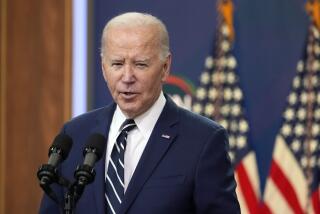Readers React: Minimum-wage multiplier effect
Economist Brad Schiller cautions that President Obama’s proposal to boost the minimum wage to $10.10 an hour would cost hundreds of thousands of jobs. He doesn’t mention the multiplier effect of a wage increase. (“A higher minimum wage -- at what cost?,” Opinion, May 27)
The multiplier effect is the single most powerful factor in growing an economy. It is to macroeconomics what compounding is to investing.
Schiller mentions the 500,000 jobs that “might” be lost (according to the Congressional Budget Officer report), but he conveniently omits the fact that the CBO also states that the wages of 16.1 million workers would go up. The positive multiplier effect on the 16.1 million workers would more than make up for the negative multiplier effect of the 500,000 who “might” lose their jobs by creating new jobs due to added demand.
In 1992, James Carville famously coined the phrase, “It’s the economy, stupid.” It’s time for an update: “It’s the multiplier effect, stupid.”
Eric Geisterfer
San Pedro
Schiller’s valid points are regrettably blunted by his disdain for the public. While polls are unsuited for steering legislation, they aren’t without purpose: They reveal aspirations.
If the public had more than the one-dimensionality of polls, even taller waves might roil the political waters. The minimum wage matters, yet it is a surrogate for the real issue: stagnated wages. This cannot be legislated but is subject to national policy.
The public was uninvited in plotting certain trade deals or in scrutinizing the wage-stealing, job-stealing deceptions of the supply side.
So here’s a thought: Ask us what we really want to be polled about.
Curtis Selph
Lancaster
More to Read
A cure for the common opinion
Get thought-provoking perspectives with our weekly newsletter.
You may occasionally receive promotional content from the Los Angeles Times.






